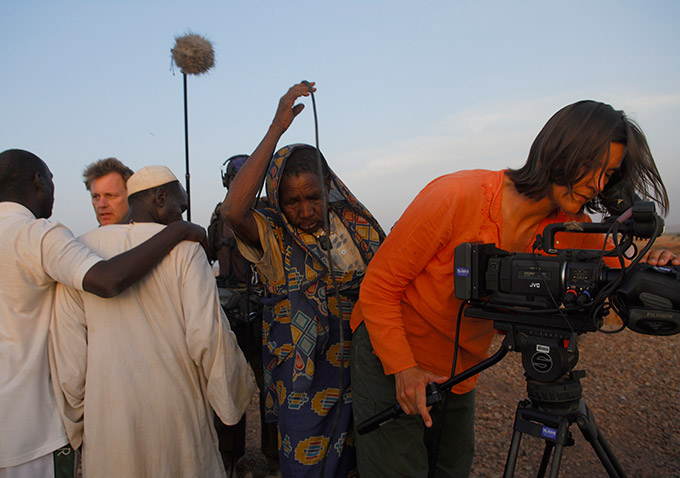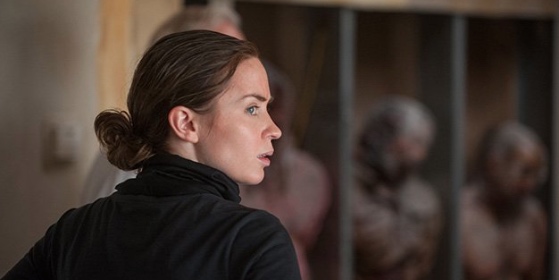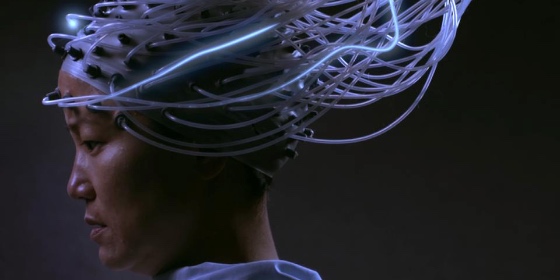
“You’re making me cry even though I don’t understand the language.”
Wanderlust. It’s a bug that bites us all, and yet very few have the privilege of their passport resembling a makeshift United Nations souvenir. Legendary cinematographer Kirsten Johnson (Citizenfour, Pray the Devil Back to Hell, The Oath) has been so lucky, and in her most recent documentary, Cameraperson, she re-visits the places she’s been and the people she’s met over the course of her 20-plus year career. But the results are far from an itemized travelogue: the documentary is a frank exploration of power and privilege that intentionally blurs the lines between the professional and the personal.
Composed of raw footage from her past shoots, Cameraperson is more than a behind-the-scenes look at Johnson’s work on some of the most politically charged documentaries of the past decade. Not only does Johnson weave in contemporary footage of her ailing mother, she also doesn’t include a voiceover or dates. In providing virtually no background to when or where a particular scene originated, the film breaks away from conventional linear narrative and offers a poetic journey through Johnson’s life.
When it comes to her occupation, Johnson is well aware of the complexities that arise from observing the world from behind a camera—and it’s not a position she takes lightly. Throughout our conversation, questions on relationships between videographer and subjects reigned supreme. From shooting Muslim Bosnian rape survivors, to refugees in South Sudan, to a young woman conflicted about her abortion, Johnson considers how to use her tool to express others rather than exploit.
cléo: To follow in the spirit of this journal’s namesake, Cléo of Agnès Varda’s Cléo de cinq à sept (1962) who comes to self-realization by mastering her space, I’m curious whether taking ownership of your space on foreign soil was an immediate or a learned skill?
Kirsten Johnson: A total learned skill. I don’t feel the phrase “mistress of her space” would be quite the words I would use to describe what I’m feeling when I’m filming in other places: it’s both a place that I find, connect to, and respect to not be my territory. I’m often in this place of trying to read cues and get signals from people that it’s okay with them to proceed or not. It always feels like a searching experience for me, which I enjoy. I like that way of being in the world, and I like the way in which the camera gives me the capacity, or perhaps the reason, to do that.
cléo: Would you say it’s a “searching experience” everywhere you go, on every new location?
KJ: Absolutely. In any situation, you’re trying to make sense of something you don’t understand. Yet I don’t think any of us understand how to make a film while we’re doing it. The pressures of time, money, light means you want things to happen in moments when they don’t necessarily happen. And then with the people we’re filming with, it’s that back of forth of why they’re letting us film, what it means to them, and whether they’re revealing more or less than what they want. All of that energy is very much in flux. I like being in that territory—even though it can be very anxiety provoking, especially for the director. I experience it more pleasurably since I’m there with the camera I have a more clear purpose in a way.
cléo: You studied at Brown and originally wanted to be a critical theorist. How does that background inform your relationship with the complexities of the camera and whom it captures?
KJ: I think the critical theory of the era [the 1980s] in which I was educated really made me think very particularly about the representation of the “Other.” Put that in triple quotes! I really was thinking a lot about what it meant to be a white person in the United States, and what that means when I go out in the world. It’s really fascinating to me how long it took for me to really think about gender. I think because it was more interesting to me to see myself in the more problematic positioning; to question myself and try to understand my own blind spots. Obviously, I’m a woman in the world and am experiencing the particularities of that, but that wasn’t the area of questions in my mind. I was interested in the history of colonialism and the history of racism, and particularly race in the U.S. Those questions about history and contemporary politics very much informed how I think about filming other people.
cléo: You engaged as a white person but not as a white woman?
KJ: Right. As I look back on some of the choices I’ve made, what’s interesting is that I gravitate toward difficulty. I’ve wanted to engage with what has been difficult for me to understand. That’s part of what guides me. I’m always amazed when I discover one more blind spot, and in a certain way it comes from a sense of hubris where you imagine you might have zero blind spots. Discovering your own blind spots is totally shocking.
cléo: Did being a cinematographer allow you to be on a constant learning process?
KJ: It feels that way. You’re seeing things through this lens and then you’re remembering you’re a person in space; that you could move and stop [an event you’re filming] from happening. All of those questions are very much alive, and it seems like a metaphor for the questions I faced when filming.

cléo: Did you ever think a day would come where so many people could have access to a platform to document their lives?
KJ: I absolutely never imagined it, and I think that’s fantastic. It’s incredibly empowering for all of us, but also there’s this double-edged sword. It’s created this world where it’s hard to protect people’s images and easy to invade privacy, even exploit people with images. But the democratization is all-positive to me. For example, I teach for a lot of international students, I have students from China, Egypt, Syria, and Morocco who are all in the process of making films. But once they’re finished, it’s a real question mark whether they’ll be able to return to their own countries. That’s what I mean by the complications that arise now with our capacity to make dissenting work that gets seen everywhere—including the very people they’re making it in opposition to.
I’ve wanted to engage with what has been difficult for me to understand.
cléo: I need to ask about the title: why Cameraperson?
KJ: Cameraperson is what I call myself. I love that in a very simple way it’s about these relationships involving the camera and people, but also in reference to the gender neutral [terminology] is important. Pretty much every day I carry a camera someone accidentally calls me a “cameraman.” And I say: “I’m a cameraperson.” I like that it implies that anyone can be a cameraperson, and we are all camera people. It has multiple meanings for me; it’s also a working class term, not like cinematographer. I’m a cameraperson. I do the work.
cléo: There’s a montage in the middle of the documentary of sites, places, and buildings where mass murder was committed. As a viewer it was a moment of remembrance. What did it mean to you?
KJ: Much of the work that I’ve done was in post-combat zones. I ended up walking on the land of mass atrocity and trying to figure out how to record what I feel when I have been in those places. There’s always this sense of impossibility of capturing or recording remembrance. To be in Rwanda, in a church where 10,000 people have been massacred, and it’s literally rotting because there’s no resources to create a space to remember what happened… to bump that image up beside other spaces like the World Trade Center, where a great monument is built in honour of this tragedy that happened there, creates a space to think about these differences.
cléo: This documentary contains past footage you shot around the globe, but is grounded in the private moments with your mother. Is it the desire to recapture what’s gone or relive the past the heart of your project?
KJ: The fact that film can keep people alive in a way, but their origins are these questions of permission and complicity is at the core. Is it okay to film other people? And when or how is it okay? When is it transgressive or betrayal? My mother really never wanted to be filmed; she absolutely would not want to be filmed as a person with Alzheimer’s. This meant filming her was this simultaneous act of love and betrayal. You try your hardest to give people their space, but at moments you know you’re capturing their image in ways they may or may not be okay with. It’s that rocking back and forth between respect and betrayal that I feel like is at the heart of the film.
cléo: What does risk-taking mean to you?
KJ: I don’t perceive myself as someone who “takes risks,” but as someone who is more interested in being in the territory where there are high stakes. I don’t want to hurt myself or anyone else; I’m not doing it for the thrill or adrenaline. That’s not my motivation. But I’m sure in certain moments that’s compelling. It was absolutely gripping being in Yemen [for The Oath], but I’m there for other questions. I’m there to be engaged in these moments in history.
[Author’s Note: Although Cameraperson is a visual memoir, Johnson’s 8-minute short film, The Above (2015), now on The Intercept, is considered her more autobiographical yet.]





